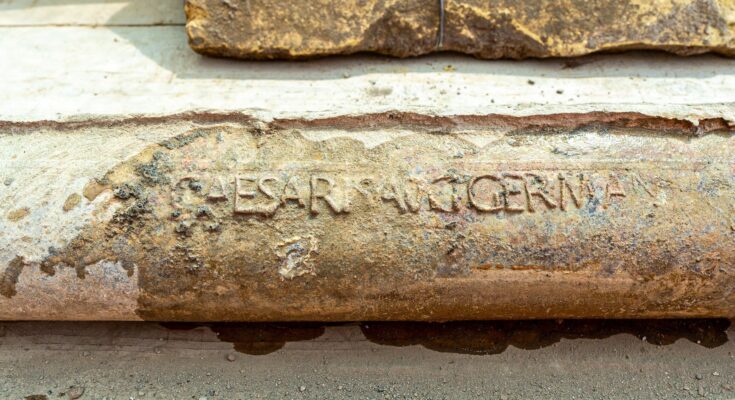Workers building a new bridge in Italy have found a garden that belonged to a Roman emperor 2,000 years ago. The garden’s stone walls look out over the Tiber River in Rome near Vatican City.
This was discovered at Piazza Pia, as announced by the Italian Ministry of Culture. Archaeologists cleared away rubble and discovered a lead water pipe with an inscription that read: “C(ai) Cæsaris Aug(usti) Germanici.”
Researchers identified this as referring to Gaius Caesar Augustus Germanicus, famously known as Caligula. His soldiers affectionately called him “Little Boot,” a nickname from his childhood.
The garden likely belonged to Caligula
The garden is believed by researchers to have belonged to the notorious Roman Emperor Caligula. This is based on the inscription on a lead water pipe. Caligula, known for his tyrannical reign and cruel treatment of the Senate, ascended the throne in 37 AD.
Just four years later, in 41 AD, he was assassinated by the Praetorian Guard, the very officials tasked with his protection, as reported by Live Science.
This finding is backed by a passage in the ancient text “On the Embassy to Gaius,” written by the Egyptian philosopher Philo of Alexandria. It recounts Caligula’s meeting with a Jewish representative from Alexandria at a large garden near the Tiber River.
During this period, there was tension and violence between Jewish and Greek Alexandrians over religious matters. Despite the Jews’ pleas for religious freedom, Caligula favored the Greeks.
Caligula’s garden found near the garden of Agrippina the Elder
Alessio De Cristofaro, an archaeologist from the government agency in Rome, responsible for archaeology, fine arts, and landscape preservation, stated that the discovery is important because Piazza Pia is located near the “Horti Agrippinae.” It was the garden of Agrippina the Elder, who was Caligula’s mother.
The Horti Agrippinae was a grand villa estate situated on the western bank of the Tiber River near the present-day location of St. Peter’s Basilica. The estate stretched down to the river, featuring a terrace with a portico.
Moreover, this area became popular for rich families. It was where they built their large and luxurious homes, called “Horti,” around the end of the first century BC.
The recently uncovered pipe resembles another one discovered in the early 1900s inscribed with the name Iulia Augusta, the second wife of Augustus and grandmother of Germanicus. Researchers suggest that the property may have been inherited by Germanicus and later passed to his wife, Agrippina the Elder, before eventually coming into Caligula’s possession.
Alongside the pipe, archaeologists unearthed slabs of Roman pottery and terra-cotta figures depicting mythological scenes, likely used to adorn rooftops during ancient times.



